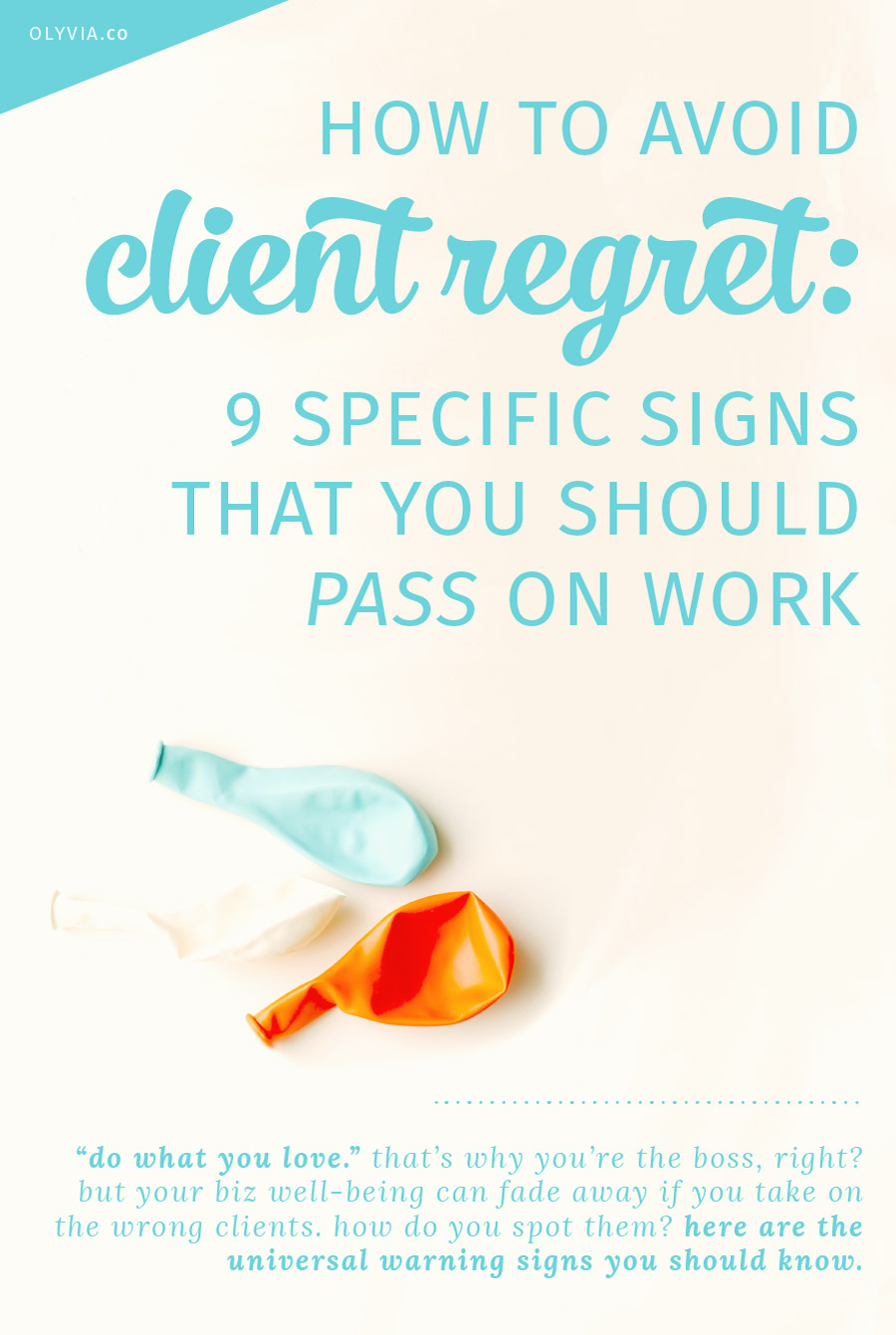How to Avoid Client Regret: 9 Signs That You Should Pass on Work

When I started doing graphic + web design work full-time as a freelancer, it never occurred to me that there was such a thing as “client regret.”
Avoid bad clients? Nah. There’s no such thing, right?!
Money, after all, is money.
(Oh yes, go on. Laugh at my naïveté. I won’t be offended.)
Perhaps I can redeem myself by admitting that it didn’t take me long to wake me up from my rose-colored world where business owner and client skipped merrily along down the path to glorious pastures of perfectly completed projects, timely payments, and goodwill toward all.
About my third or fourth client in, it was then that I realized: being selective when it comes to clientele is not only perfectly acceptable…it’s an act of profound kindness. For yourself and your business, of course, but even for the other person (who deserves to work with somebody fitted toward their unique wants + personality).
We are all pretty good people. I firmly believe that. But not everyone is meant to work together, and not everyone is a fabulous client.
“Sounds reasonable,” you say. “But how do I spot a bad client before they BECOME a bad client and I have to see the job through to the bitter, smothering end?”
That’s a hard thing to recognize at first, which is why I’ve compiled the following 9 early warning signs (gleaned from my own experiences in the wild wild west that is solo business ownership). I’ve also included a couple of word-for-word scripts you can use to say “no” to potential work that exhibits these — or any other — red flags.
Before you take on a new client, run through this list first. It helps!
AVOID BAD CLIENTS BY TAKING THESE EARLY WARNING SIGNS SERIOUSLY
1. The potential client demonstrates wildly inconsistent communication
Years ago, when I was still in the destructive freelance mindset of “I have to say yes to everyone or I’m just a lazy bum,” I let a potential graphic design client lead me around for months with promises of work.
One week everything was an urgent mess (“we need to meet for lunch like NOW and, oh, we want your proposal in 24 hours tops”), then I wouldn’t hear from them for a month (“we’re still talking about what we want to do…”).
Four months later we finally signed a contract, but the inconsistent communication continued. Sign off approvals on my work were excruciatingly slow in coming, and what should have only taken a couple of weeks ended up dragging out for so. many. months.
It wasn’t just obnoxious — though it was certainly that! — having extended delays in the creative design process prevented me from doing my best work. (The client was happy, but I was not.)
If you take on a client who can’t maintain regular, reasonable communication, chances are that the ensuing delays will cost you both needed income + precious sanity. Instead, use this script to set them free:
Hi (insert potential client’s name),
Thank you so much for the opportunity to explore working on your (insert the kind of project/service they want done here) together. Regrettably, after some further consideration I’ve come to realize I’m not the best (designer, photographer, chef, artist, etc) suitable for your particular project/needs. However, I’d love to help you find the right person for this important (project/event/…). Below I’ve provided a list of some respected (designers, photographers, chefs, artists, etc) that I recommend.
(insert list of referral names + contact info here)
Again, thank you for considering me (insert potential client’s name). I wish you (much success with your new website/a beautiful wedding/…)!
Warmly,
(insert your name here)
2. The potential client belittles and/or rudely challenges you about your fee
In business it’s normal for price to be a sticking point for some people. Yet, there’s a vast difference between the potential client who says, “I’m not prepared to spend that much right now — what could you do for me at X?” — or, “Who could you refer me to that’s within my budget of Y?” — and the person who retorts with something like this:
“Wow. You must think you’re pretty special.”
Or, “I know a neighbor’s co-worker’s second cousin thrice removed who charges HALF that. So I know it’s definitely not worth what you’re saying it is.”
Or, “You can’t be serious. Get back to me with something reasonable and maybe then we can talk about this.”
You can be sure that if a person has so little respect for you, a working relationship is not going to be a rewarding, successful one. You’ll be bullied throughout the entire process, leaving you with a perpetual feeling of resentment or fear. Here’s how to politely (because you’re a professional like that) remove yourself from the situation:
Dear (insert potential client’s name),
I understand that my (fee/rate/…) is not for everyone. Since it sounds like you need something at a lower price point, I’m going to refer you to (insert list of referral names + contact info here). They are all excellent (copywriters/developers/coaches/…) and I recommend them without hesitation.
I wish you much success (with your e-book/going forward/…).
All the best,
(insert your name here)
3. The potential client wants you to work for free or “on spec”
It pains me to admit this reality, but there’s a group of people out there that think that because you work for yourself, you don’t need to be paid for your time + talents.
If you meet a person like this, they’ll likely say something like, “We’re not in a position to compensate you for this particular project, however we’re convinced that it would be perfect for your portfolio. And of course if things go well, there’s the opportunity for lucrative future work. (hint hint, wink wink)”
If it’s a friend or family member, they might say, “I just need this so bad, but I totally have no money. If you do this for me I promise I’ll recommend you to EVERYBODY I know!”
And others will ask you to give them spec work, meaning that you provide your service to them up front — at no cost — with no guarantee of eventual payment. (“If I like it, I’ll pay you!”)
All offer promises that rarely see realization, though they do offer plenty of headache, heartache, + hobbling bank accounts.
To run a successful business for the long term requires, at minimum, fair payment. Don’t be afraid to insist on it or say “no thank you.”
4. The potential client pressures you to start work without a contract
A contract is the one thing that stands between you + the lurking disasters inherent to doing business with flawed humans. Most people respect this. They understand that no contract equals no work.
But if you work independently for long enough, you’re sure to come across a few who want to overlook this “minor” detail.
“Let’s just start and I’ll get the contract signed when I get back into town next week…” they say.
“I really want to stay on schedule with this project, so why don’t you do A, B, and C. You don’t have to worry about the contract, I’ll get it to you!” they promise.
You may feel pressured to cave (just this once!), particularly if said person represents an opportunity for huge income and/or prestige, is someone you know, or seems oh-so-sweet. Don’t do it, though. If an attorney, counselor, or key smith won’t do work without an agreement, either should you.
The good news is that, in this situation, you rarely have to walk away from the job entirely. Many potential clients will respond well to an upbeat but firm, “I’m as excited as you to get started! I will need to get your signature on the contract before I can begin any work, however. As soon as I get that, we can dive right in. Thanks!”
(If they get insulting or otherwise offensive at this reminder, be alarmed. Use the script in point #1 to bow out quickly.)
5. The potential client expects you to be available 24/7
Unless we’re talking about Jonathan Rhys Meyers, the individual who wants your immediate attention any time of day — all days of the week, no matter if it’s outside business hours or on a holiday — is a dangerous person to add to your clientele.
This person can be spotted by their flood of increasingly hyper Facebook messages between 8 p.m. and midnight or the Sunday morning Twitter DMs asking, “Did you get my email I sent last night??”
They might also pressure you for 4 a.m. Skype sessions, twice-daily Hangouts, or daily “progress reports.”
They may text you incessantly with questions. Thoughts. Epiphanies.
If they’re local, this person will call you at 10 a.m., wanting you to meet them somewhere (“real quick”) at no later than 11 a.m. Or, if they’re part of an organization, they will request that in addition to your work for them, you also attend all of their weekly or monthly meetings/luncheons/parties “just so you can get to know us.” (Will you be compensated for this extra time? No ma’am.)
If you see signs of this kind of behavior before you enter into a work agreement, don’t hesitate: educate (or re-educate) them ASAP about your availability policy. Outline what kind of contact methods are appropriate, your strict working hours, etc. Be explicit and leave no room for interpretation.
“I won’t be attending any weekly luncheons.”
“I accept text messages if there is an emergency only. For the purposes of my business, an emergency is: ___________.”
“I respond to emails every Monday - Thursday from 1 p.m. to 2:30 p.m. ET.”
Include all of this in your contract. Make sure they see it…again.
If you still don’t sense that they “get it” — or they give you grief about it — it’s risky to go any further. Once you have their money in hand, they will act even more entitled to every spare second of your life. Not a pleasant thought, is it?

6. The potential client won’t fully participate in your initial discovery questions
This was a business lesson I learned almost immediately. In exploring a design project for one of my first “big” potential clients, I came upon their curious tendency to hedge around almost all of my specific questions regarding their goals, ideas, likes, + dislikes.
I was a bit frustrated, but the lure of a paycheck led me to believe it was no big deal. I could handle it…right?
Right.
Later, after the contract was already signed, I sent a more detailed questionnaire. It was grudgingly sent back over a week later. Many of the responses went like this:
“It’s up to you.”
“I don’t really have any examples of things I like.”
“I’m not sure why that’s important.”
“The style I like is… Well, I just want it to POP. You know?”
You might think this kind of client is more open than most to your own creative ideas, but alas: it’s often the opposite. In my case I found out (well over a month later) that this client in fact knew EXACTLY what they wanted — and had their ideas in mind all along — but didn’t think it important to share it with me up front when I had asked.
I wasted a shocking number of hours doing work for them that had to be totally scrapped.
Naturally, if they had taken some time to cooperate with my initial questions, the situation would have been a whole lot different!
Unless they can be persuaded to the importance of their thorough, thoughtful input beforehand, don’t take on a client who is uncooperative + inarticulate. It shows a profound lack of respect towards you, plus it only sets you up for failure down the road.
7. The potential client wants you to (essentially) copy another’s work
This doesn’t happen a whole lot (thankfully!), but when it does? It’s a deal breaker.
“I want my logo to look just like __________’s logo, but with my biz name and maybe a slightly different color.”
“I just love ___________’s website copy — it’s perfect. I want mine to say nearly the exact same thing. Just with a few of your personal flourishes here and there, of course.”
“I want the same ebook cover photo and font as ____________. Can you just copy it?”
This sketchy situation is hard to catch before you both sign on the dotted line, but from time to time you do get lucky. (It helps if you’re diligent with asking exploratory questions early on.)
When you do find out their intentions, your next step is to educate this person about A) your ethical standards, B) copyright law, and C) how they’re paying for your skills + expertise in creating something uniquely for them — and that will represent them in the best possible light. Try to get your potential client to look past the idea of copying the object of their desire and instead explore what about it can be used for inspiration in creating something completely new.
If they still won’t budge, don’t sacrifice your reputation, creativity, and (potentially) your business itself in order to appease them. Explain that while you’d love to help them, you can’t take on that kind of risk. Then take your clear conscience and walk away.
8. The potential client complains about others they’ve worked with
This is an easy situation to spot, which is good…because then it makes it easy for you to pass on the work without getting too invested in the person or the project. From the moment you start communicating with a potential client like this, they’ll usually clue you in fast with remarks like:
“Oh gosh, I’m so glad I found you! The last two big name coaches I’ve worked with left A LOT to be desired. I just seem to have bad luck finding people who really have the skills they advertise…”
“I had to fire my last sales page designer because she (insert anywhere between 3-99 different reasons as to why the person was egregious at her job). It was devastating! And she came so well-recommended, too…”
“I’ve run through 5 different social media managers in the last 6 months because nobody seems to know what they’re doing.”
“We’re working with someone on a different project right now and having quite a few problems with them… We just don’t know what we’re going to do. Have you heard anything about them by chance? Their name is ___________.”
What’s hardest about avoiding a bad client like this is that it’s so freaking tempting to take on the role of being the “business hero” in this person’s life. With all these horrible experiences, it’s easy to believe that surely you can step in and save the day.
But oh, my friend.
That so rarely happens.
The fact of the matter is, people who say things like the above in a professional setting either thrive on perpetual drama or secretly pride themselves on being hard to please. (Sometimes both.) For awhile you will play their savior, but when the time is right, you’ll soon be transferred to the inevitable role of The Incompetent Biz Owner — and your name will be besmirched with all the rest of them.
Your best bet when meeting a dissatisfied, gossiping individual who wants to hire you? Get far away while you still can.
9. The potential client gives you the heebie jeebies, whirly willies, or any other sort of bad “gut feeling”
I don’t know what whirly willies are, actually. (I hope not something super inappropriate. I’m a little too frightened to Google it.) But you get what I’m aiming for, right? Those people who just make you feel like…shrinking, squirming, or slithering inside.
What makes it hard on you as a business owner is that these people are those who, by all appearances, would be perfectly fine to work with. They seem polite + responsive. They’re not knocking every other expert in your niche. They’re willing to pay your going rate. They’re clear on what they want.
You feel you SHOULD work with them. You really have no objective reason not to.
Except for that nagging, uncomfortable feeling in your stomach.
There are some that would tell you to ignore it and “be a man.” They might even break into a catchy little Disney song, like this one. But I’m not one of those people, and I’m here to assure you that it’s okay to listen to your intuition.
It’s there for a reason.
Sometimes very unwell people are so successful at being manipulative that they can slip past people’s radar screens. They know how to act the part so that no one can accuse them of anything too obvious.
But our human brains are still extraordinary at recognizing inconsistencies and actions or words that are ever-so-slightly off. If you don’t dismiss its subtle “alarm,” you can save yourself a world of trouble. Please take my word on that, and don’t ever feel bad for passing on work that, for whatever reason, seems wrong.
Do you have any red flags that you watch for when considering working with someone? Have you encountered any of the situations above? Do you feel comfortable turning down work? Tell me about in the comments below.

(Chief Olyvia)
You may also like these posts:
30+ Top Tips for Making Customers Love Your Biz
The ‘Secret’ Trick to Delivering Consistent Customer Service as an Online Biz Owner
How to Handle Negative Comments Online (Like a Pro)
Delight: The Digital Biz Owner’s Guide to Creating a Pro Client + Customer Service Plan
How to Get Clients to Pay (for Sensitive Business Owners)





